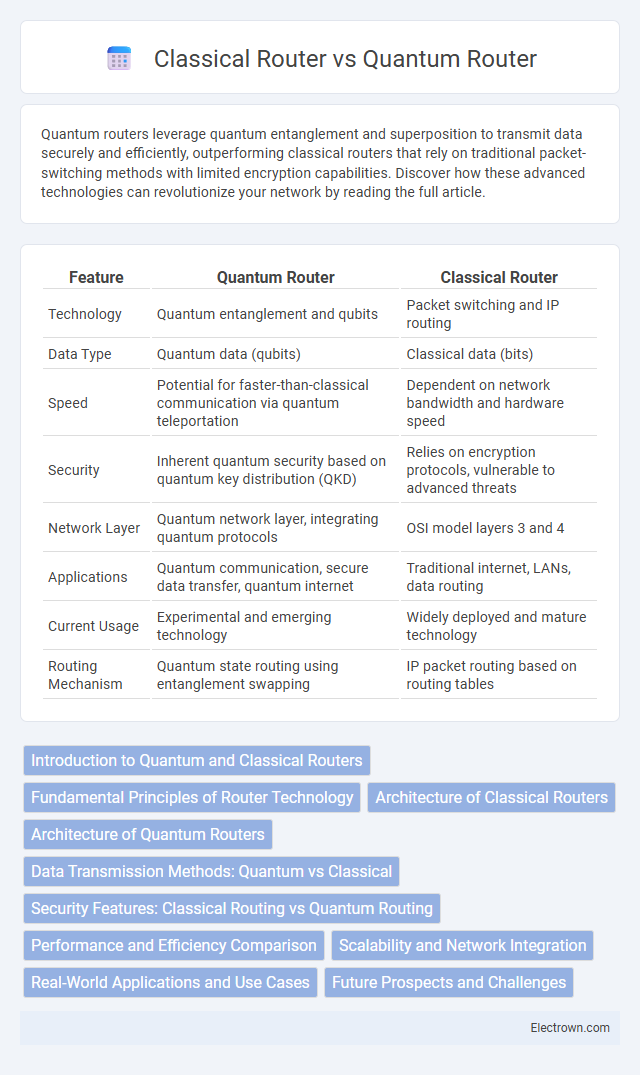Quantum routers leverage quantum entanglement and superposition to transmit data securely and efficiently, outperforming classical routers that rely on traditional packet-switching methods with limited encryption capabilities. Discover how these advanced technologies can revolutionize your network by reading the full article.
Table of Comparison
| Feature | Quantum Router | Classical Router |
|---|---|---|
| Technology | Quantum entanglement and qubits | Packet switching and IP routing |
| Data Type | Quantum data (qubits) | Classical data (bits) |
| Speed | Potential for faster-than-classical communication via quantum teleportation | Dependent on network bandwidth and hardware speed |
| Security | Inherent quantum security based on quantum key distribution (QKD) | Relies on encryption protocols, vulnerable to advanced threats |
| Network Layer | Quantum network layer, integrating quantum protocols | OSI model layers 3 and 4 |
| Applications | Quantum communication, secure data transfer, quantum internet | Traditional internet, LANs, data routing |
| Current Usage | Experimental and emerging technology | Widely deployed and mature technology |
| Routing Mechanism | Quantum state routing using entanglement swapping | IP packet routing based on routing tables |
Introduction to Quantum and Classical Routers
Quantum routers utilize principles of quantum mechanics, such as entanglement and superposition, to transmit quantum information securely across quantum networks. Classical routers manage data packets in traditional binary form, directing internet traffic based on IP addresses and routing protocols like OSPF or BGP. Your choice between a quantum and classical router depends on the need for quantum communication capabilities versus conventional data routing efficiency.
Fundamental Principles of Router Technology
Quantum routers leverage principles of quantum mechanics, such as superposition and entanglement, to transmit and route quantum information securely through quantum networks. Classical routers operate on electronic packet switching based on IP addresses, using binary data transmission and established networking protocols like TCP/IP. The fundamental difference lies in quantum routers' ability to handle qubits and perform quantum state manipulation, enabling enhanced security and computational capabilities beyond classical routing methods.
Architecture of Classical Routers
Classical routers feature a packet-switching architecture with dedicated hardware components such as control planes and data planes to manage data forwarding. They use predefined routing tables and protocols like OSPF and BGP to direct packets across IP networks efficiently. The architecture relies on electronic processing using CMOS technology, enabling scalability and compatibility with existing network infrastructures.
Architecture of Quantum Routers
Quantum routers utilize quantum entanglement and superposition principles to transmit qubits, enabling secure and efficient data transfer through quantum networks, unlike classical routers that rely on packet switching and IP protocols. Their architecture integrates quantum memory, quantum repeaters, and photon detectors to facilitate quantum state preservation and error correction, ensuring reliable communication. Your network infrastructure can leverage these advanced components to achieve unparalleled speed and security in data routing.
Data Transmission Methods: Quantum vs Classical
Quantum routers transmit data by utilizing quantum entanglement and superposition, enabling instantaneous and secure transfer of qubits across quantum networks. Classical routers rely on packet-switching protocols and electronic signals to forward data packets based on IP addresses through conventional networks. The quantum approach significantly enhances data security and transmission speed by exploiting quantum cryptography, whereas classical routers depend on encryption algorithms vulnerable to interception.
Security Features: Classical Routing vs Quantum Routing
Quantum routers leverage principles of quantum mechanics such as quantum key distribution (QKD) to provide theoretically unbreakable encryption by detecting eavesdropping attempts through quantum state disturbances. Classical routers rely on traditional encryption protocols like SSL/TLS and IPsec, which are vulnerable to advances in computational power and algorithmic attacks over time. The inherent security advantage of quantum routers lies in their ability to enable secure communication channels with provable security guarantees unattainable by classical routing methods.
Performance and Efficiency Comparison
Quantum routers leverage quantum entanglement and superposition to enable ultra-fast data transmission with exponentially higher processing power compared to classical routers, which rely on binary signal routing and traditional semiconductor technology. Your network performance benefits from quantum routers through significantly reduced latency and increased bandwidth efficiency, as they can manage vast amounts of information simultaneously without classical interference. While classical routers remain more widely available and cost-effective, quantum routers present superior scalability and energy efficiency for future high-demand communication infrastructures.
Scalability and Network Integration
Quantum routers face significant challenges in scalability due to the fragile nature of quantum states and the requirement for quantum repeaters to maintain coherence over large distances, limiting widespread network integration. In contrast, classical routers benefit from mature infrastructure, enabling seamless scalability and compatibility with existing network protocols and hardware across vast and diverse environments. Efforts in quantum network research aim to develop hybrid models that integrate quantum routers with classical networks, enhancing scalability while leveraging the distinct advantages of quantum communication.
Real-World Applications and Use Cases
Quantum routers enable ultra-secure communication through quantum key distribution, making them ideal for government, military, and financial sectors requiring top-tier data protection. Classical routers remain essential for everyday internet access, supporting high-speed data transfer and connectivity across homes, businesses, and data centers. Your network infrastructure could integrate quantum routers as they become more accessible, enhancing security without compromising existing classical routing performance.
Future Prospects and Challenges
Quantum routers promise revolutionary advancements in secure communication through quantum entanglement and superposition, offering unparalleled data transmission speeds and resistance to hacking. Classical routers, while reliable and widely deployed, face inherent limitations in speed and security as network demands grow exponentially. Your ability to adapt to evolving technologies hinges on navigating challenges like quantum decoherence, infrastructure costs, and integration with existing networks to fully realize the future potential of quantum routing.
quantum router vs classical router Infographic

 electrown.com
electrown.com